When a person is sentenced to a sentence of real imprisonment, the judicial authority must determine the type of correctional institution in which the convicted person will serve his term. This takes into account: the identity of the attacker, the category of the committed act and other circumstances of the incident. Citizens who have been convicted of crimes of small, medium gravity (intentional and reckless), who have not previously served time in isolation from society, should be sent to colony settlements. This rule is enshrined in article 58 of the Criminal Code. Although the court may decide otherwise. Men convicted of serious acts who had not previously served their sentences in isolation from people are sent only to general-regime correctional facilities. This will be discussed in more detail in this article.
Main

Deprivation of liberty is one of the most severe punishments imposed on a convicted person for an atrocity crime. The type of correctional institution in this case will depend on the gravity of the deed. So, for committing reckless and deliberate atrocities (if the term does not exceed five years), men and women should be sent to serve their sentences in penal colonies. But this is only possible if citizens have not previously been in places of isolation from society.
In addition, when examining the circumstances of the crime and the identity of the perpetrator, the judicial authority may send the latter to serve his sentence in a colony where a general regime is established. This is indicated by the norm of Art. 58 of the Criminal Code.
When committing grave acts
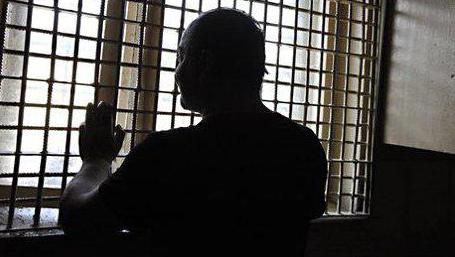
In this case, men who were not previously convicted should be sent to serve their sentences only in the colony where the general regime is established. This is written in Art. 58 of the Criminal Code. In this case, the judicial authority does not have the right to elect another correctional institution in relation to these persons.
Women convicted of serious and very serious atrocities are also sent to serve sentences in penal colonies in which the general regime is established. This happens even if the representative of the beautiful half of humanity has already been previously convicted and has committed a relapse of crimes. This rule of sentencing convicted women is enshrined in Art. 58 of the Criminal Code.
In the event that a previously convicted man again commits a serious atrocity, then he will already serve a new term in places of detention where a strict regime is established.
Features
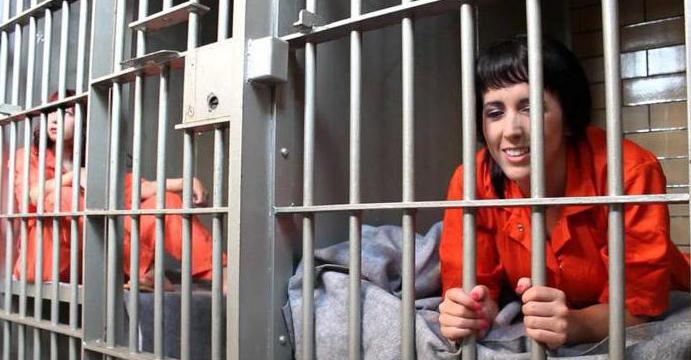
As can be seen from the norms of Art. 58 of the Criminal Code of the Russian Federation, representatives of the beautiful half of humanity for committing dangerous and very serious atrocities, the court can appoint to serve their sentence only in general regime colonies. Even if a woman has committed a criminal offense repeatedly and already has a criminal record, she will still be sent to correctional facilities of this type. For crimes committed through negligence, the fair sex is serving a sentence in a settlement or receive suspended sentences. This is due to the fact that women are much harder than men to endure being in places of isolation from society.
Teenagers who commit atrocities under the age of 18 are sent to serve their sentences only in educational colonies. This is also stated in the norm of Art. 58 of the Criminal Code.
Adult men who have previously been convicted of particularly serious acts should be sent to serve time in correctional facilities, where a strict regime is established.In addition, with a dangerous recurrence of atrocities, these persons can be identified in places of isolation from society with a special order of stay. Representatives of a strong half of humanity, sentenced by the court to life imprisonment, also serve their sentences in special colonies, where a special regime is established.
Change the type of correctional facility

It is made only by court order. For this, the administration of the correctional institution must provide the relevant authority with a statement stating objective reasons. If a person is serving a sentence in a penal colony and violates the procedure established there, then he can be transferred to a general regime in another correctional institution. In practice, there are a lot of such cases.
It should also be noted that for good behavior the court can change the convict’s order of serving the sentence and transfer the offender from strict conditions to the settlement. In addition, the observance by a citizen of the order established in places of isolation from society is very important for his early release.
From a colony where a special regime for the stay of perpetrators is established, a convicted person can be transferred to an institution with strict conditions only after a person has served half of the prison term.
What does it depend on
If the court came to the conclusion that the convicted person will not be able to reform without isolation from society, then this authority should determine the type of correctional institution in which the guilty person will serve his term. This will depend on the severity of the atrocity committed and the person's personality.
For unintentional acts, the perpetrator must be sent to serve a sentence in a settlement colony. But in the presence of certain circumstances, the court may determine the convicted person in another correctional institution, where the general regime is established. Only in such a case, this authority should indicate the reasons for the decision, because it is prescribed in Art. 58 of the Criminal Code in the new edition.
In addition, it should be noted that women for committing grave and very serious atrocities should be sent to serve their sentence only in a colony where a general regime is established. Life isolation from people to the fair sex is not assigned. Because it will be illegal and not humane in relation to the weak half of humanity. In addition, the women's colony is a correctional institution where a general regime is established. Representatives of the fair sex are engaged in work in the clothing industry.
A women's colony cannot be a maximum security prison. Because it is not prescribed by law.
In addition, adolescents under the age of 18 at the time of sentencing should be sent to serve their sentence only in a juvenile colony.
What's the Difference
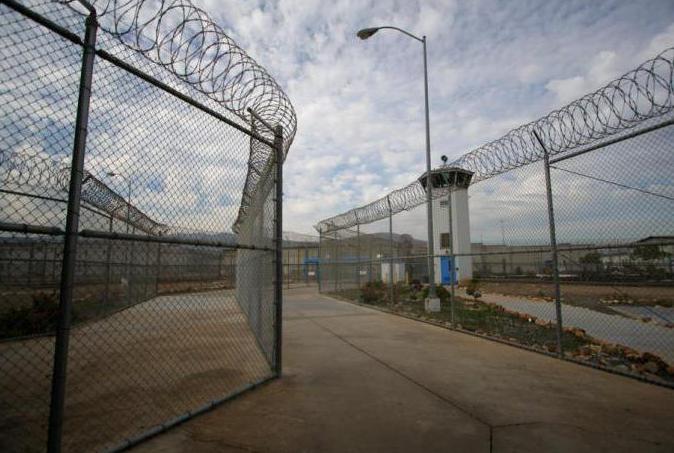
Adult men who have committed serious acts should be sent by the court to serve their sentence in correctional colonies of general and strict regimes. What kind of institution will look like depends not only on the identity of the guilty person, but also on whether he served his sentence in prison before or not. In the event that a man who has recently been released from places of isolation from society commits a new crime, then he will serve his next term in a colony where a strict regime is established. But only on condition that earlier he was already convicted of atrocious crime.
As a rule, in penal institutions of a general regime, men who were first convicted of intentional atrocities, as well as citizens who did not follow the rules of the established order in a colony settlement, were serving a sentence, violated the regime and were transferred there by decision of the judicial authority.
In correctional institutions where a strict regime is established, men who are first convicted of very serious atrocities are serving their sentences.There are no female colonies with this order of maintenance. Men who have a criminal record for serious atrocities and again committed similar crimes will be identified in a maximum security colony.
Comments
The legislation established that various categories of convicts should serve their sentences in correctional institutions that are prescribed in Art. 58 of the Criminal Code. One cannot disagree with the comments on this article. After all, a court cannot go beyond the law and send a convicted person to a correctional institution, relying only on his conviction. But in this case there is one exception. When imposing punishment for reckless or deliberate acts of small and medium gravity, instead of a colony of a free settlement, the judicial authority may send the convicted person to places of isolation from society where the general regime is established. But in this case, this authority in the sentence must indicate the reasons for making such a decision.
The designation of persons sentenced to deprivation of liberty of a correctional institution is determined by Article 58 of the Code of Crimes. This means that the court, when pronouncing the sentence and sending the offender to places of isolation from society, should be guided only by the norms of the law. Serving the sentence, depending on the committed crime, the perpetrator may:
- in a colony settlement;
- in general or strict mode;
- in prison (only part of the term);
- in a special regime colony (convicted for life and with the re-commission of very serious atrocities);
- in an educational, correctional institution (allowed only for minors).
Settlement
Citizens who committed atrocities of negligence, intentional crimes of minor or medium gravity, but only on the condition that these persons were not in places of isolation from society, are serving a term appointed by the court at this correctional facility. In addition, convicts from colonies of strict and general regimes are transferred to the settlement. This is done if the latter followed the established procedure and worked well.
A colony of a free settlement is a correctional institution where, at the same time, persons of the opposite sex may serve the term appointed by the court. At the same time, men and women should live in different dormitories and not intersect with each other.
As a rule, unsuccessful drivers are serving a term in a settlement, due to which people, as well as citizens who have committed minor economic acts, died or were seriously injured. In the specified correctional institution, previously non-convicted persons should be separately from those who were transferred from the colonies of general and strict regimes.
At the settlement, convicts can receive parcels, parcels, packages, without any restriction. In addition, they are allowed to carry cash. Perpetrators serving their sentences in a settlement may have visits without limiting their number.
Educational and labor colony for minors
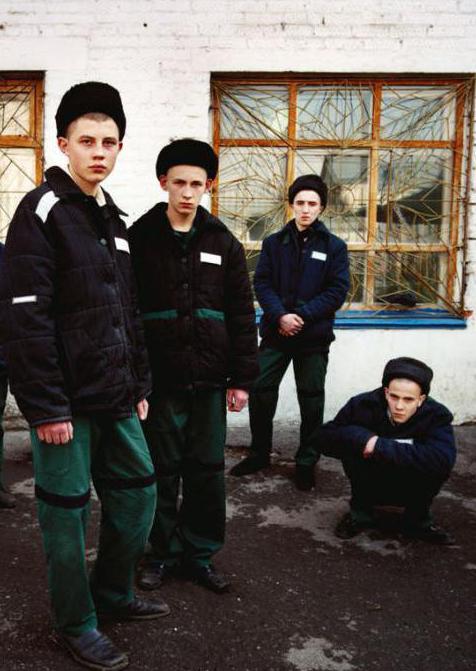
Citizens who have committed crimes at the age from 14 to 18 years are serving their sentences in this correctional institution. In addition, adult colonies may be kept in educational colonies, but only until they are nineteen years old. This is the law. Educational colonies are intended only for juvenile intruders, for whom the court determined the punishment of isolation from society. The main task of these institutions is to correct adolescents who have committed crimes at a young age. Teachers of educational colonies should help the little offender to realize his mistakes and put him on the path of law-enforcement.
Particular attention is paid to the educational process. In addition, in the colony for adolescents, there are various courses that allow them to master a profession.The educational process in the colony should prepare adolescents for an independent life, as well as help them realize their illegal behavior.
Part of the term
In some cases, the court appoints the perpetrator to serve his sentence in prison. This is possible if the latter committed a particularly serious crime or re-implementation of the same crime.
For example, a man committed the murder with particular cruelty and served his sentence. But after his release from a maximum security colony, he decided to crack down on another citizen. As a result, the man was again convicted and sent to prison.
In this case, the time that the offender spent in custody until the sentence entered into force shall be counted in time. After the part of the serving of the sentence in prison has ended, the convicted person will be transferred to a strict or special regime colony.
Practice
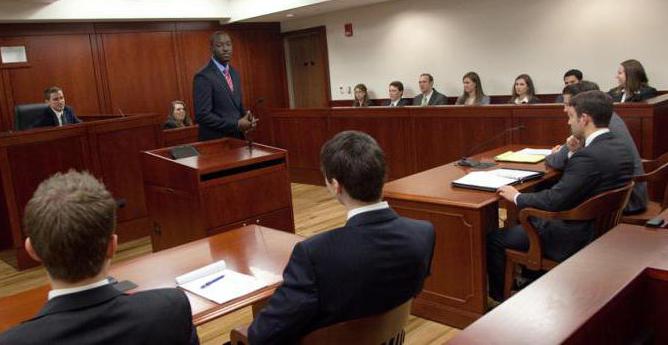
A man made a road accident in which a person died. At the trial, he pleaded not guilty; moreover, he wanted to evade responsibility for what he had done. As a result, he was assigned to serve his sentence in places of isolation from society. In this case, in a colony settlement. From the very beginning of the sentence, the man began to violate the established regime, did not want to work, in addition, he bought alcohol in the store and illegally carried him to the hostel. After this incident, the colony administration applied to the judicial authority with a request that this citizen be transferred to general regime.
From the case materials:
The representative of the institution in court supported the petition and requested that the indicated convict be transferred to the colony where the general regime was established. In support of his position, the head of the detachment provided irrefutable evidence that the citizen did not comply with the daily routine and did not show up for construction and work. Moreover, the convict purchased alcohol in a local village store and carried it to the colony. This was reported to the head of the institution by another person serving a sentence. As a result, the judicial authority came to the conclusion that the convict should be transferred to a colony where a general regime is established. The man was sent to further serve his sentence in another correctional institution.
What you need to know
Convicts must serve their sentences in the correctional institution that is prescribed by law. The court does not have the right to decide this issue on its own conviction. Especially if the law contains a direct indication of what should be the type of institution in which the offender will serve his sentence.